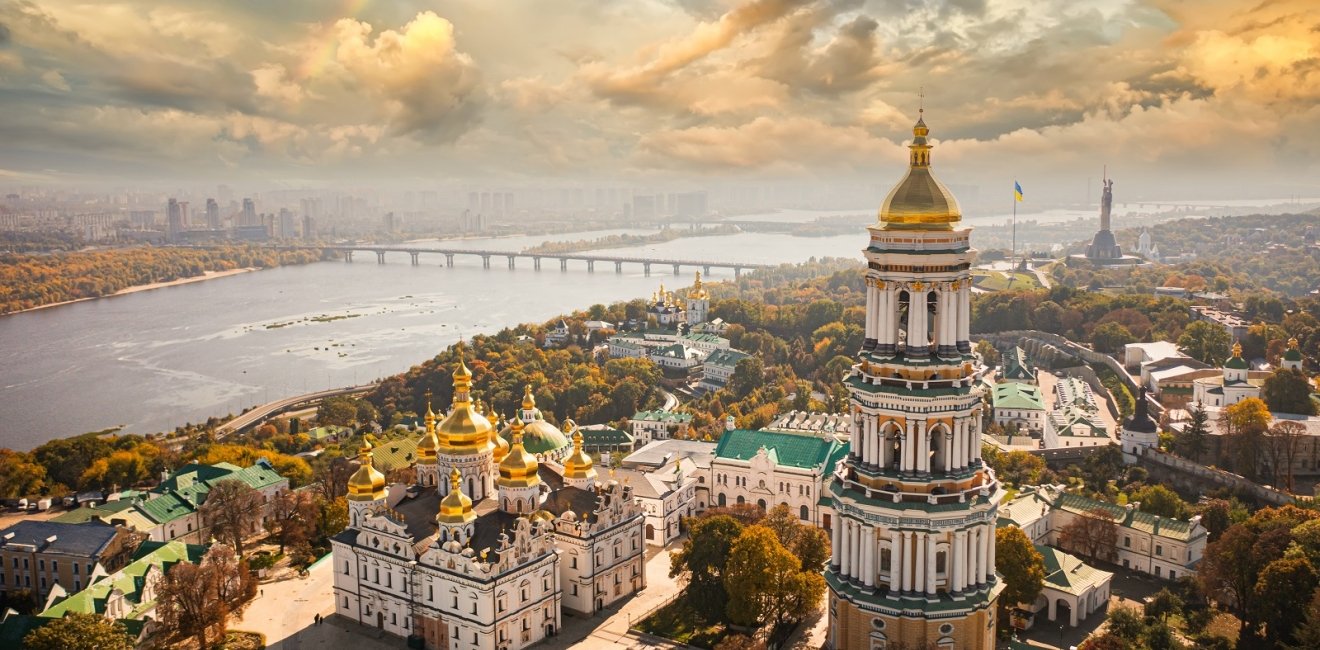
A blog of the Kennan Institute
One of Ukraine's biggest churches, the Ukrainian Orthodox Church (UOC), is entangled in a major controversy in Ukraine. The government says that it is part of the Moscow Patriarchate of the Orthodox Church during wartime against Russia, and as such is a pro-Russian organization. The individual churches within the UOC say they are not. In August 2024, the Ukrainian Rada introduced legislation requiring all religious institutions to sever ties with Russia within the next nine months or be banned. Targeted by the law and public disapproval, the UOC’s rank-and-file members reject the designation of their churches as pro-Russia and are reluctant to make any compulsory changes from outsiders.
Orthodox Christianity, with its thousand year history in Ukraine, is more than a religion–it is a tradition that connects its members to the past and present of their nation. For many, Orthodoxy is a national heritage with a civic as well as religious character, which effectively means that Orthodoxy is everyone's concern. So, it's unsurprising that UOC, with its ties to Russia, has attracted critical attention since Ukraine proclaimed independence in 1991. Following Russia’s full-scale invasion of Ukraine in 2022, some UOC practices were portrayed as evidence of pro-Russian sentiment among its members. The issue of language used in church services and some venerated saints were identified as particularly concerning.
The UOC prays in Old Slavonic and venerates the Russian Emperor Nicholas II. Both practices attract criticism against the UOC for refusing to switch to the Ukrainian language and for continuing to include a Russian tsar among its saints. However, in-depth research reveals a more nuanced picture (and provides the source of attributed statements below).
Each UOC parish can change its service language if its members want to, but not many parishes have taken this step. The reason behind it is mostly about tradition. Introducing another language means learning new texts and new melodies for them. For some, it is a challenging task. As one elderly woman put it, she would like to pray in Ukrainian but is anxious about learning new passages.
The decision to change goes beyond “tradition,” however. The Old Slavonic prayers have an intrinsic beauty for UOC worshipers that could not possibly be translated. One priest feared that translation would damage his church just as badly as the abandonment of Latin did to Catholics since it destroys the feeling of sacredness. Some younger parishioners disagree. The reluctance to switch from Old Slavonic is generally regarded within the UOC as an internal debate between tradition and reform, rather whether it is an expression of pro-Russian sentiment.
The same applies to saints such as Nicholas II. Even some within the UOC concede that displaying icons depicting a former Russian emperor might be inappropriate during Russia’s invasion of Ukraine. And yet, many of them challenge the insistence from “outsiders” that the veneration of saints translates to a secular commemoration of them as historical figures. One priest emphasized that his parish venerates Nicholas not for his role as an emperor, but for his “exemplary Christian family life.” Many parishioners echo this view, separating the Christian lessons they learn by venerating a saint from the actual history of a given saint’s life, which they call irrelevant.
In addition to language and saints, critics in Ukraine argue that the refusal of UOC parishes to re-affiliate away from the Moscow Patriarchate is evidence of their pro-Russian loyalty. After Russia annexed Crimea and fueled separatist conflict in Ukraine’s Donbas in 2014, the UOC came to be seen as a tool of Russian soft power. Ukraine’s then-president Petro Poroshenko tried to capitalize on this sentiment in his reelection campaign by championing the establishment of a national church called the Orthodox Church of Ukraine (OCU) as a patriotic alternative to the UOC.
Today, the public consensus in Ukraine agrees that UOC parishes should re-affiliate with OCU to prove they truly left the Russian church and Moscow’s influence. Approximately one out of twelve UOC parishes has done so since 2022. What usually prevents re-affiliation is not always pro-Russia sentiments, even if there is some according to those who left the UOC recently. The main obstacle is the lack of legal clarity.
The crux of the problem is that UOC parishes usually do not have a fixed membership, yet the question of re-affiliation requires a vote by each church’s parishioners. In view of the priests and church regulars, only those who come every Sunday should have the right to a vote, excluding those who also call themselves Orthodox but do not frequently attend. Attitudes about re-affiliation vary, but many in the UOC explain that the regular worshipers at individual churches resent the idea of “outsiders taking over our churches,” and resist any change that the outsiders might push as a result. Yet the state authorities do not share this differentiation, effectively recognizing equal voting rights for “outsiders” and “regulars” alike.
Some parishioners find the very question of re-affiliation of minor relevance. This sizable group profess loyalty not to the UOC, but to their individual place of worship and its community of believers. If that community decides to re-affiliate, they will follow—and vice versa. In the words of one, the name of Patriarch of the Church is far less important than the community within their local church.
The controversy surrounding the UOC is thus about ownership and misunderstanding. Who owns the tradition? Who has the right to speak about it? Ukrainian society on the whole sees Orthodoxy as a shared heritage for the whole nation—a nation currently fighting the Russian invader. This civic majority is not ready to delegate the right to say otherwise to a small group of clergy and regular churchgoers, particularly when Russia weaponizes religion and its own Church to justify its invasion of Ukraine.
Conversely, believers within the UOC reject that viewpoint, arguing that only active members of the UOC parishes have the right to discuss or amend ecclesiastic issues within the church.
As a result, misunderstandings between the two sides arise and escalate quickly, especially around the issues of language, saints, and re-affiliation. There are pro-Russia individuals within UOC who are unhappy with the idea of changing the language from Old Slavonic or of re-affiliation. It is beyond doubt that Russia uses their own church institutions as well as narratives about how Ukraine represses the UOC for propaganda purposes in their country. Regardless, many believers within the UOC have demonstrated a will to fight to retain their own expression of faith and resist any external interference in how they express that faith—even if it goes against the popular national consensus or their government.
The opinions expressed in this article are those solely of the author and do not reflect the views of the Kennan Institute.
Author


Kennan Institute
The Kennan Institute is the premier US center for advanced research on Eurasia and the oldest and largest regional program at the Woodrow Wilson International Center for Scholars. The Kennan Institute is committed to improving American understanding of Russia, Ukraine, Central Asia, the South Caucasus, and the surrounding region through research and exchange. Read more

Explore More in Focus Ukraine
Browse Focus Ukraine
Talking to the Dead to Heal the Living

Ukrainian Issue in Polish Elections


